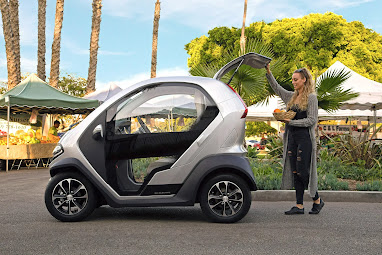Electric and Autonomous Vehicles: Revolutionizing Transportation for a Sustainable Future
Introduction
The automotive industry is undergoing a monumental transformation with the advent of electric and autonomous vehicles. Electric vehicles (EVs) are revolutionizing transportation by offering eco-friendly alternatives to traditional combustion engines, while autonomous vehicles are set to redefine mobility through advanced Artificial Intelligence (AI) and sensor technologies. In this article, we will explore the benefits, challenges, and future prospects of electric and autonomous vehicles.
The Rise of Electric Vehicles
The increasing popularity of electric vehicles stems from their numerous advantages. EVs significantly reduce greenhouse gas emissions, contributing to improved air quality and mitigating climate change. Moreover, owning an electric vehicle offers cost advantages such as lower fuel and maintenance expenses. With advancements in battery technology and charging infrastructure, EVs are now more practical and convenient than ever before.
Understanding Autonomous Vehicles
Autonomous vehicles, or self-driving cars, have the potential to transform the way we travel. These vehicles utilize sophisticated sensors, AI algorithms, and mapping technology to navigate and operate without human intervention. The levels of autonomy range from basic driver-assist features to fully autonomous driving. The benefits of autonomous vehicles include increased road safety, enhanced traffic efficiency, and improved accessibility for individuals with limited mobility.
The Intersection of Electric and Autonomous Vehicles
The combination of electric and autonomous vehicle technologies holds great promise for the future of transportation. Electric powertrains in autonomous vehicles offer several advantages, including efficient energy utilization and reduced environmental impact. The integration of electric vehicle technology facilitates the power and sensor requirements of autonomous systems, enabling seamless integration between the two technologies. Shared mobility and autonomous electric vehicle fleets have the potential to revolutionize urban transportation and reduce congestion.
Challenges and Considerations
Despite the promising prospects, electric and autonomous vehicles face challenges. The availability of charging infrastructure is a key concern for electric vehicles, although rapid advancements are being made to address this issue. Autonomous vehicles face technical challenges, including the reliability and accuracy of sensors, as well as regulatory and safety considerations. Public acceptance and trust in these technologies play a crucial role in their widespread adoption, necessitating education and awareness campaigns.
Future Outlook and Innovations
The future of electric and autonomous vehicles is bright, with ongoing innovations and advancements. Battery technology continues to improve, enhancing the range and charging speed of electric vehicles. Integration of renewable energy sources and smart grid systems further enhances the sustainability of electric vehicles. Autonomous vehicle technology is evolving rapidly, with advanced AI algorithms and machine learning driving breakthroughs. Continued testing, development, and deployment of autonomous vehicle fleets are expected in the coming years.
Safety Concerns and Regulatory Frameworks in Electric and Autonomous Vehicles
Discover the key safety considerations surrounding electric vehicles. As electric vehicles gain popularity, ensuring safety is paramount. Explore the latest measures addressing battery safety, charging infrastructure standards, and vehicle regulations. Stay informed to make informed choices for a secure and reliable electric vehicle experience.
a. Explore the safety features of electric vehicles, such as lower center of gravity and advanced braking systems.
b. Discuss the safety advancements in autonomous vehicles, including advanced sensor technologies and real-time data analysis to mitigate risks.
Environmental Impact of Electric and Autonomous Vehicles
a. Discuss the positive environmental impact of electric vehicles, such as reduced greenhouse gas emissions and dependence on fossil fuels.
b. Highlight the potential of autonomous vehicles in further improving environmental sustainability through optimized driving patterns and reduced traffic congestion.
Electric and Autonomous Vehicles in Urban Environments
a. Examine the benefits of electric and autonomous vehicles in urban settings, such as reduced noise pollution and improved air quality.
b. Discuss potential challenges and solutions for integrating these vehicles into existing urban infrastructure, including charging stations and smart city initiatives.
Economic Implications of Electric and Autonomous Vehicles
a. Analyze the economic impact of electric vehicles on industries such as oil and gas, automotive manufacturing, and renewable energy.
b. Discuss potential job creation opportunities and economic growth resulting from the adoption of electric and autonomous vehicles.
Government Policies and Incentives for Electric and Autonomous Vehicles
a. Explore government initiatives, regulations, and subsidies that promote the adoption of electric and autonomous vehicles.
b. Discuss the role of public-private partnerships in fostering research and development in these areas.
Ethical Considerations in Autonomous Vehicles
a. Examine ethical dilemmas associated with autonomous vehicles, such as decision-making algorithms in potential accident scenarios.
b. Discuss ongoing debates surrounding liability and responsibility in accidents involving autonomous vehicles.
Consumer Adoption and Perception of Electric and Autonomous Vehicles
a. Explore consumer attitudes towards electric and autonomous vehicles, including factors influencing their adoption or hesitation.
b. Highlight the importance of consumer education and awareness to dispel myths and misconceptions surrounding these technologies.
Educating the Public on Electric Vehicles
Learn about the benefits and limitations of EVs, it's crucial for the people like us to know about benefits and limitations for advanced decision making. Discover their positive impact on the environment, reduced operating costs, and government incentives. Understand range limitations, charging infrastructure, and debunk myths. Empower yourself with knowledge for a greener future.
Benefits
Environmental Impact
- Zero tailpipe emissions
- Reduction in greenhouse gas emissions
- Improved air quality
Cost Savings
- Lower operating costs compared to gasoline vehicles
- Reduced maintenance expenses (fewer moving parts)
- Potential government incentives and tax credits
Energy Efficiency
- Electric motors are more efficient than internal combustion engines
- Regenerative braking captures and recycles energy
Performance and Driving Experience
- Instant torque for quick acceleration
- Smooth and quiet operation
- Lower center of gravity improves handling
Energy Independence and Renewable Integration
- Reduction in dependence on fossil fuels
- Integration with renewable energy sources for sustainable charging
Limitations
Limited Driving Range
- EVs typically have a shorter range compared to traditional vehicles
- Long-distance travel may require careful planning and access to charging infrastructure
Charging Infrastructure
- Availability and accessibility of charging stations may vary by location
- Charging times are longer compared to refueling gasoline vehicles
Upfront Cost
- EVs often have a higher upfront purchase price compared to gasoline vehicles
- Battery costs contribute to the initial expense
Charging Time and Convenience
- Charging an EV takes longer than refueling a gasoline vehicle
- Limited availability of fast-charging stations
Battery Degradation and Replacement
- EV batteries degrade over time, affecting range and performance
- Battery replacement can be expensive
Conclusion
Electric and autonomous vehicles are poised to revolutionize transportation, offering sustainable and efficient alternatives to traditional vehicles. The benefits of electric vehicles, such as reduced emissions and lower costs, combined with the transformative potential of autonomous vehicles, present an exciting future for mobility. Overcoming challenges and fostering public acceptance will be key to realizing the full potential of these technologies. Embracing electric and autonomous vehicles is not just a step towards a greener future, but also a leap into a new era of transportation.
THANK YOU FOR READING!!
FOLLOW FOR MORE AMAZING CONTENT
MUST READ-


.jpg)













